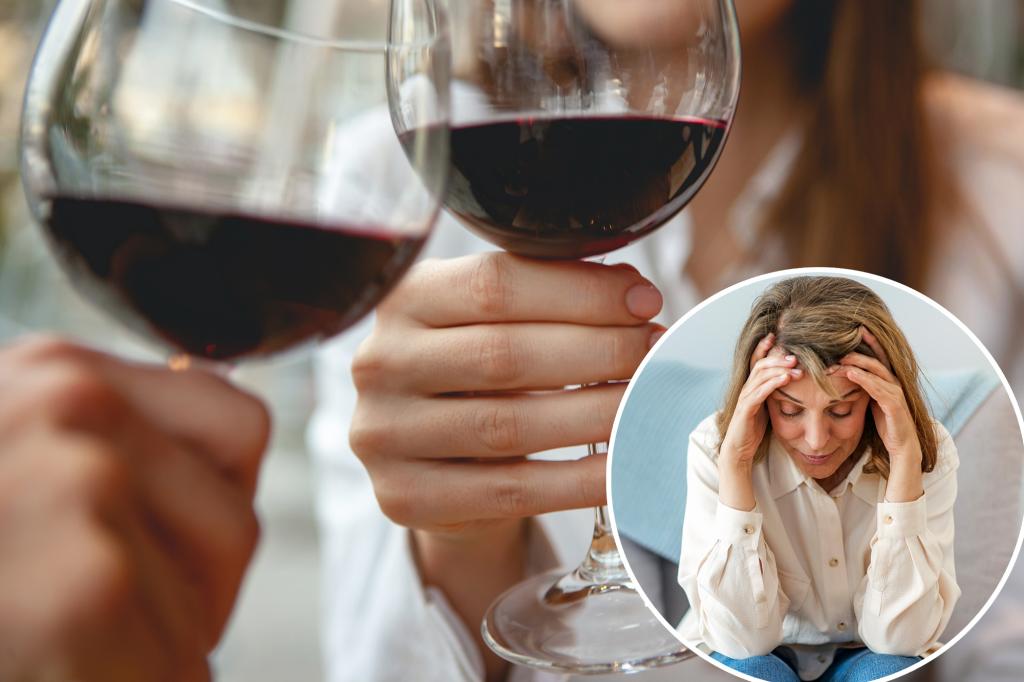The mystery of the red wine hangover has long plagued oenophiles, but researchers believe they’ve finally uncorked the answer. A study conducted by scientists at the University of California, Davis, points to quercetin, a phenolic compound abundant in red grape skins, as the primary culprit behind the dreaded morning-after misery. This compound, present in higher concentrations in red wines due to the extended skin contact during fermentation, interferes with the body’s natural alcohol processing mechanism, leading to a cascade of unpleasant effects.
The research, spearheaded by enology professor Andrew Waterhouse and postdoctoral researcher Apramita Devi, focused on the interaction between quercetin and the enzyme aldehyde dehydrogenase (ALDH). ALDH plays a crucial role in breaking down acetaldehyde, a toxic byproduct of alcohol metabolism. Their findings revealed that quercetin acts as a potent inhibitor of ALDH, effectively slowing down the breakdown of acetaldehyde. This disruption leads to a buildup of acetaldehyde in the bloodstream, triggering inflammation and the characteristic throbbing headache associated with red wine hangovers. Further compounding the issue, a metabolite of quercetin, known as quercetin glucuronide, also interferes with alcohol metabolism, exacerbating the acetaldehyde accumulation.
The telltale flushed skin often accompanying a red wine hangover is another consequence of the excess acetaldehyde. This visible symptom, coupled with the headache, signals the body’s struggle to efficiently process the alcohol due to the quercetin-induced metabolic slowdown. While other compounds found in wine, such as sulfites, biogenic amines, and tannins, have often been blamed for hangover woes, the UC Davis study downplayed their roles. The researchers argued that the levels of sulfites and biogenic amines in wine are too low to elicit such pronounced effects. Tannins, while present in high concentrations in red wines, are also found in other beverages and foods like tea and chocolate, which rarely cause headaches. This observation further supports the notion that quercetin is the primary driver of red wine hangovers.
The researchers meticulously examined the various components of wine to determine the true culprit behind the hangover. Sulfites, often cited as a cause of wine-related headaches, were dismissed due to the relatively low concentrations present in a typical glass. The human body possesses sulfite oxidases, enzymes capable of efficiently processing the small amounts of sulfites found in wine, making it unlikely that they contribute significantly to hangover symptoms. Similarly, biogenic amines, nitrogenous substances found in many fermented foods and drinks, were ruled out due to their insufficient quantities in wine. While these amines can cause adverse reactions in some individuals, the levels in wine are generally too low to trigger widespread hangover effects.
Tannins, another common suspect, were also exonerated. While red wines contain high levels of tannins, which contribute to their dryness and astringency, these compounds are not unique to wine. Tannins are present in various other foods and beverages, such as tea and chocolate, which don’t typically induce headaches. This observation led the researchers to conclude that tannins are unlikely to be the primary cause of red wine hangovers. Instead, they focused their attention on other phenolic compounds, particularly quercetin, which is abundant in grape skins.
The researchers’ investigation into the role of quercetin revealed a compelling mechanism linking it to red wine hangovers. Quercetin, they discovered, interferes with the activity of ALDH, the enzyme responsible for breaking down acetaldehyde. This inhibitory effect leads to a buildup of acetaldehyde in the body, contributing to the unpleasant symptoms of a hangover. This finding provides a plausible explanation for why red wines, which have higher quercetin content due to extended skin contact during fermentation, are more likely to cause hangovers than white wines.
Furthermore, the researchers discovered that quercetin glucuronide, a metabolite of quercetin, also disrupts alcohol metabolism, further exacerbating the accumulation of acetaldehyde. This dual action of quercetin and its metabolite provides a compelling explanation for the severity of red wine hangovers. The researchers’ findings suggest that grapes exposed to more sunlight produce higher levels of quercetin. This implies that wines produced from sun-drenched grapes, often associated with bolder flavors and higher price tags, may also be more likely to induce hangovers. Consequently, opting for less expensive wines, potentially made from grapes grown in less sunny conditions, could be a strategy for red wine enthusiasts seeking to minimize the risk of a morning-after headache.


